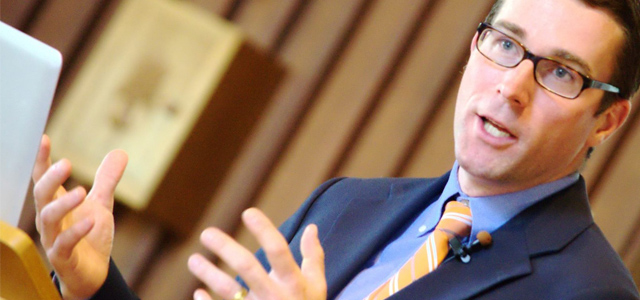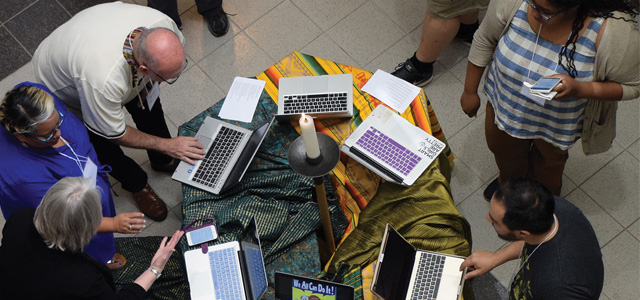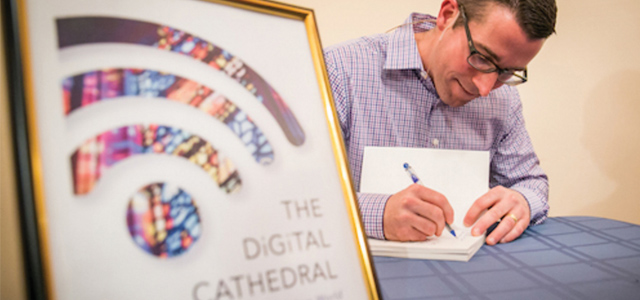Held annually in Washington DC, the EFormation conference promotes faith formation, strategic theological thinking about church communication, and digital best practice. All in the name of #Jesus. Insights Managing Editor Adrian Drayton attended this recent missional event and interviewed Keith Anderson, an expert in online ministering.
The EFormation conference gathers people from all denominations who are involved in strategic communication within their Christian organisations. EFormation assists and engages religious practictioners and lay people in conversations, plenaries and boot camp sessions around the question: How can we better connect with and encourage online Christian communities in an ever-increasing secular landscape?
While the social media universe has, for years and years, showed no signs of shrinking, the church has not been keeping up with the tsunami of information available to spiritual inquirers with no religious allegiance. These days, meeting the needs of those searching for God is unfortunately being answered by Google and Siri, not by cyber-savvy Christians.
What has become evident is that people are either “Gutenbergers” or “Googlers”, according to Dr Leonard Sweet. Author of From Tablet to Talk: Where Community is Found and Identity is Formed, Sweet spoke at EFormation about the social gap between people of the printed word (Gutenbergers) and people of the screen (Googlers). To put that division another way, so many these days can be classified as either “digital natives” or “digital immigrants”. Churches tend to be filled with “digital immigrants”, those not born in the digital age and who are reluctant to even begin dipping toes into social media and an online networked world.
During the EFormation conference, Insights sat down with author and Reverend, Keith Anderson. He has written two books — The Digital Cathedral: Networked Ministry in a Wireless World and Click 2 Save: The Digital Ministry Bible, co-authored with Elizabeth Drescher.
Both of these books explore the notion of the Church in the digital space, what it might look like and how churches can be more active online. More importantly, though, Anderson believes that not being on social media — or, at least, exploring how church can reach non-believers online — will further widen the gap between Christianity and the societies around us.
Minister at the Upper Dublin Lutheran Church in Ambler, Phildelphia, Anderson is trying to bridge the divide between digital immigrants and natives. He is doing ministry in a lot of innovative ways, including working with the New Media Project (founded in 2010). Anderson is a highly sought-after speaker and thought leader. It was a great privilege to sit down with him and talk about his ministry and how imperative he believes it is for churches to see the value of online communication.
Rev. Keith Anderson
Tell us about your church context.
“We are a large suburban church outside of Philadelphia. Upper Dublin Lutheran Church is committed to social ministry and outreach, education and faith formation. And increasingly, over the last few years, [we’ve been doing that] out in the community.”
How important a part of your ministry has social media been?
“Social media has been really important in the way we do our ministry. Being engaged in social media immediately puts you in contact with a whole different audience and range of people — the friends of the members who come to church. Community members that might otherwise never step in the door. So, I think being present in social media has a way of drawing us out beyond our church building, even if we are just sitting at our computer at our desk. In some ways, it’s a safe way to start connecting beyond the church building because, for a lot of people, that can be intimidating and they’re just not quite sure where to start.”
How has social media helped develop your thinking about community ministry?
“A lot of ministry leaders will say ‘I just don’t have any more time’ to add this sort of communication to my workload or even to do, learn or schedule social media or manage it. What I try to do is think about ways that I can integrate it into the work that I already do.”
“For instance, how can digital and social media help me in my preaching preparation, either in the content I consume or the content I create? How does it help me when I teach in confirmation class, in terms of what resources can I draw on that are available to me online? So, it becomes how I synthesise that and re-share it somehow to help others.”
Worship – EFormation-style
How does your Congregation support you in your outreach to the wider community?
“My Congregation is really supportive of doing ‘God on Tap’ and ‘Coffee and Conversation’ [two weekly gatherings Anderson facilitates, as well as Sunday services] and being out in the community. In part, [this is] because these were some things I was doing at my last church. They understood it was a passion of mine when they employed me and saw what I was doing and wanted to do it too. [But] managing expectations about how these ministries develop is important.
Is there an expectation that people coming to mid-week gatherings will come to church?
“We have definitely had some people join the church because of these ministries and we are much more connected to our community because of it. We know the store owners, the coffee shop owner, the pub owners, so we are more connected to people in our community.”
“It’s not just about people joining the church; we did a fundraiser with the brewery [where ‘God on Tap’ meets] to raise money for our local food pantry. So, we are able to find points of collaboration and later this month, I am going to be doing a wedding for the bartenders from the pub. They don’t go to church, they are spiritual but not religious – millennials – and these are people we would love to be connected to and to have in our church.
“They may not come to church, but I get to be part of this huge day in their lives.”
Keith signing copies of The Digital Cathedral
How has The Digital Cathedral helped to develop your thinking about community in a digital context?
“The book really helped me connect the dots in my ministry. There are things that I have done, just out of trial and error and to see what connects and resonates and what doesn’t. Writing the book was my chance to step back and ask, ‘How does this all fit in terms of finding God in everyday life, or [for] how we think about church in our lives?’, as we often think about church and life as
two separate spheres. In bringing them together, what [are] the deeper theological questions involved?”
And the great joy of the book was talking to other ministry leaders in lots of different contexts around the country. Asking them what they were seeing and what they were doing, and to find this common thread of being present in local and digital gathering spaces — whether they are new ‘mission’ and they don’t have a building, or they are a traditional church and looking at ways to be present in their community.”
What advice would you give to ministry leaders who don’t have time to pursue some form of online communication in their ministry?
“As a pastor, my job is to share the gospel, share the love of God in Christ Jesus and I want to do this with as many people as I possibly can. And if I am only doing that inside my church building to the people who are already there, that’s a very small subset of people.”
“I understand the church can become our whole world [but] we need to connect with people who haven’t heard the gospel or that have bad preconceptions of what the church is like. We need to be able to be real people, who have real faith and who have passion for it. My passion is to share my faith in the gospel, so I don’t think that social media and digital ministry is an elective any more for ministry leaders. It’s a real requirement — because ‘living into’ that networked space also helps us to understand and ‘live into’ the networked way people are living their everyday lives.”
There are so many demands on both leadership and church Congregations these days. What advice would you give to Congregations about digital ministry?
“We have had lots of conversations here at EFormation about connecting with young families and how they are busy; they are programmed; they’re on the go … [but] this isn’t a problem. Sometimes we can see this busyness as a problem, in terms of how we are doing our [church] programming, but the question is: How do we support them in their networked, digitally integrated, busy lives? How can we place the gospel in their hands, on devices they are increasingly using all the time?”
“I hear now that people who are being interviewed about ministry positions, they are being asked about the digital media skills. I think that should be something Congregations should recognise and be looking for
in leadership.”

















